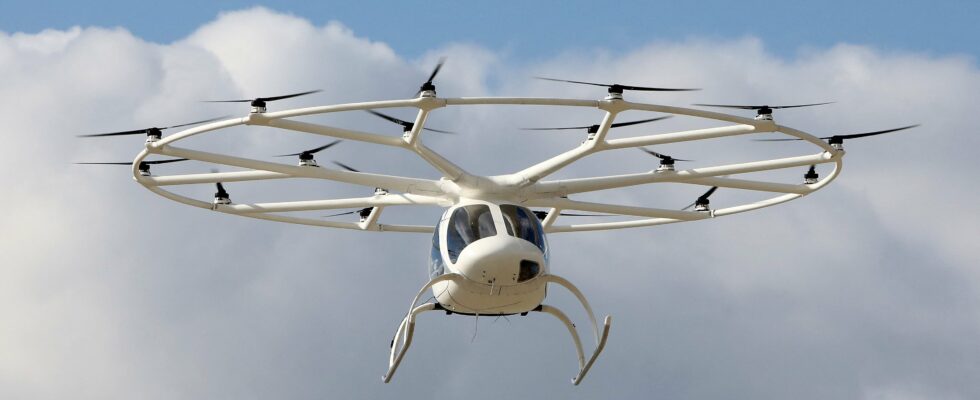They wanted to take advantage of the Olympic Games to showcase an innovative mode of transport in the skies of Paris, but the promoters of electric “flying taxis” had to give up due to lack of certification.
Airport manager Groupe ADP and German aeronautics start-up Volocopter are now aiming for a flight “by the end of the year” from a platform floating on the Seine, they announced on Thursday, four days before the end of the Games. The two companies nevertheless plan to organize flight demonstrations with a prototype, without passengers, on Thursday and Sunday at the Saint-Cyr-l’Ecole aerodrome (Yvelines), a few hundred meters from the park of the Château de Versailles, the venue for the equestrian events.
The certification of the Volocity, the machine designed and manufactured by Volocopter, suffered a “delay of a few weeks” linked to its engines, explained Edward Arkwright, the executive general director of Groupe ADP, which manages airports and aerodromes in the Paris region, including Paris-Charles-de-Gaulle and Orly, but also Saint-Cyr.
Initially, ADP and Volocopter, supported by the Ile-de-France region, wanted to carry out experimental flights from a converted platform, moored at a quay at Austerlitz, in the east of the capital, capitalizing on the global attention paid to the Olympic Games. The ultimate goal is to demonstrate the feasibility of a new mode of transport in a dense urban area, by circulating these vertical take-off and landing (VTOL) devices between several “vertiports”. Among these are the Saint-Cyr facility, which is to be inaugurated on Thursday and will include a passenger baggage screening station, a device charging station and a parking area, Edward Arkwright explained. The demonstrations will be carried out under “normal” operating conditions at the aerodrome, with the Volocity demonstrator, which will fly at an altitude of more than 50 meters, fitting into the usual traffic.
Hostile Parisian elected officials
The project, which has been discussed since the end of 2020, had already seen its ambitions revised downward in recent months, as Volocopter did not obtain certification from the European Aviation Safety Agency (EASA) in time to accommodate paying passengers. The company’s CEO, Dirk Hoke, attributed this new delay to “an American subcontractor who was not able to deliver what he had promised”. The engines to equip the machine planned for Austerlitz had to be sent back to the United States to be checked. “They will return next week, but not in time to make the flights from the barge” before the end of the Games, Dirk Hoke said. “We are a little disappointed, but in any case we had said that we would not make any compromises with regard to security”, added Edward Arkwright.
In its current version, the two-seater aircraft, including the pilot’s, is equipped with batteries powering 18 rotors arranged in a crown above the cockpit, and is much quieter than a helicopter according to its manufacturer. The Ministry of Transport and ADP have preferred in recent months to emphasize the usefulness of these machines – in future larger versions – for carrying out medical evacuations or organ transport, rather than talking about “flying taxis” associated with a mode of travel for the richest. In fact, this project has encountered hostility from Paris municipal officials, both the majority and the opposition. The city hall, speaking of an “ecological aberration”, had even challenged in court the decree published on July 9 by the Ministry of Transport and authorizing the creation of the Austerlitz “heliport”.
On July 24, the Council of State, seized in summary proceedings, ruled against the municipality, pending a decision on the merits, which is expected to be made in the fall. According to the ministry’s order, the platform’s operating authorization runs until December 31 “at the latest.” In this race against time, Volocopter has also had to deal with doubts about its viability, conceded Dirk Hoke, a transfer from Airbus, where he headed the military and space branch. “It wasn’t easy, but we managed to stabilize the company with the existing shareholders,” he explained, saying he hoped to “secure investments” by the time of the IPO, scheduled “around 2027.”
